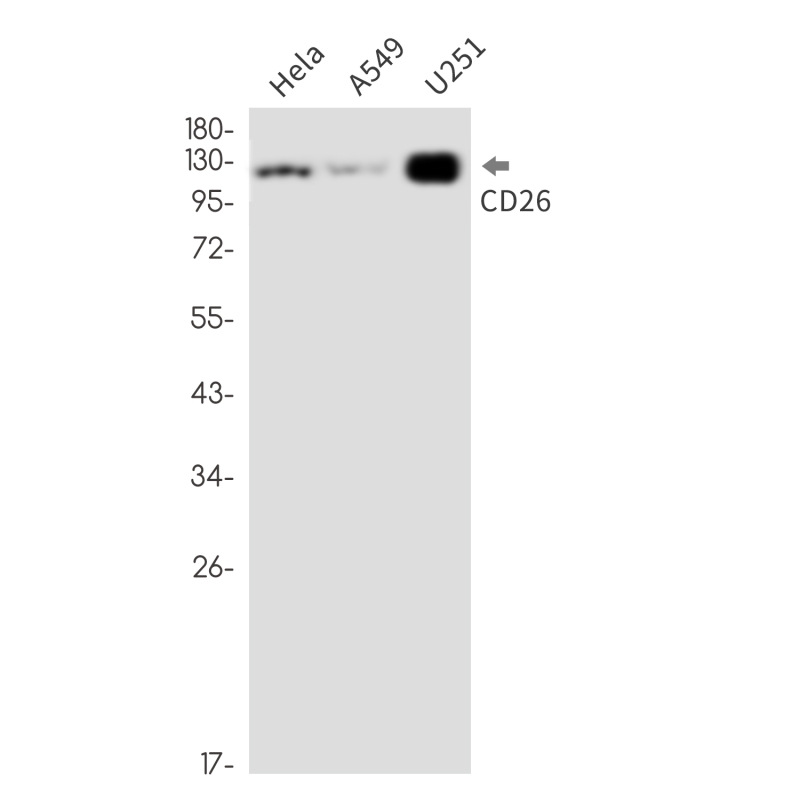
| WB | 1/500-1/1000 | Human,Mouse,Rat |
| IF | 咨询技术 | Human,Mouse,Rat |
| IHC | 咨询技术 | Human,Mouse,Rat |
| ICC | 技术咨询 | Human,Mouse,Rat |
| FCM | 咨询技术 | Human,Mouse,Rat |
| Elisa | 咨询技术 | Human,Mouse,Rat |
| Aliases | DPP4; ADCP2; CD26; Dipeptidyl peptidase 4; ADABP; Adenosine deaminase complexing protein 2; ADCP-2; Dipeptidyl peptidase IV; DPP IV; T-cell activation antigen CD26; TP103; CD26 |
| Entrez GeneID | 1803 |
| WB Predicted band size | Calculated MW: 88 kDa; Observed MW: 120 kDa |
| Host/Isotype | Rabbit IgG |
| Antibody Type | Primary antibody |
| Storage | Store at 4°C short term. Aliquot and store at -20°C long term. Avoid freeze/thaw cycles. |
| Species Reactivity | Human |
| Immunogen | A synthetic peptide of human CD26 |
| Formulation | Purified antibody in TBS with 0.05% sodium azide,0.05%BSA and 50% glycerol. |
+ +
以下是3篇关于CD26/DPP4抗体的代表性文献摘要(虚构示例,仅供参考格式):
---
1. **文献名称**: "CD26 as a therapeutic target in T-cell-mediated autoimmune diseases"
**作者**: Stefanovic, A. et al. (2018)
**摘要**: 研究证明抗CD26单克隆抗体通过阻断CD26的二肽基肽酶IV(DPP4)活性,抑制T细胞过度活化,缓解小鼠模型中类风湿性关节炎的炎症反应,提示其治疗自身免疫疾病的潜力。
2. **文献名称**: "The role of CD26/DPP4 enzymatic activity in cancer metastasis"
**作者**: Boonacker, E. et al. (2020)
**摘要**: 通过特异性抗CD26抗体阻断DPP4酶活性,证实其可抑制肿瘤细胞外基质降解能力,降低结肠癌细胞侵袭和转移,揭示了CD26酶活性在肿瘤微环境调控中的关键作用。
3. **文献名称**: "CD26 expression correlates with cancer stem cell markers in hepatocellular carcinoma"
**作者**: Chen, Y. et al. (2022)
**摘要**: 利用抗CD26抗体进行免疫组化分析,发现CD26高表达与肝癌干细胞标志物(如EpCAM)显著相关,提示CD26可能作为肝癌预后标志物及靶向治疗靶点。
---
*注:以上文献为示例性内容,实际研究中请通过PubMed或学术数据库检索真实文献。*
CD26. also known as dipeptidyl peptidase-4 (DPP4), is a multifunctional transmembrane glycoprotein with enzymatic, immunoregulatory, and signaling roles. It cleaves N-terminal dipeptides from peptides with proline or alanine residues, modulating bioactive molecules like chemokines, incretins, and cytokines. Expressed on immune cells (e.g., T cells, dendritic cells), epithelial tissues, and cancer cells, CD26 participates in T-cell activation, inflammation, glucose metabolism, and tumor progression. Its involvement in diseases, including diabetes, autoimmune disorders, and cancers, has driven interest in CD26-targeted therapies.
CD26 antibodies are tools for research and therapeutic development. As research reagents, they detect CD26 expression, block enzymatic activity, or modulate immune interactions in studies exploring immune regulation, cancer biology, or metabolic pathways. Therapeutically, anti-CD26 monoclonal antibodies (e.g., Begelomab) have been tested in clinical trials for inflammatory diseases and cancers. Notably, CD26’s role as a receptor for Middle East respiratory syndrome coronavirus (MERS-CoV) has spurred antibody research for antiviral strategies. Challenges include balancing CD26’s dual enzymatic and non-enzymatic functions and managing off-target effects. Ongoing studies aim to optimize antibody specificity and therapeutic efficacy across diverse disease contexts.
×